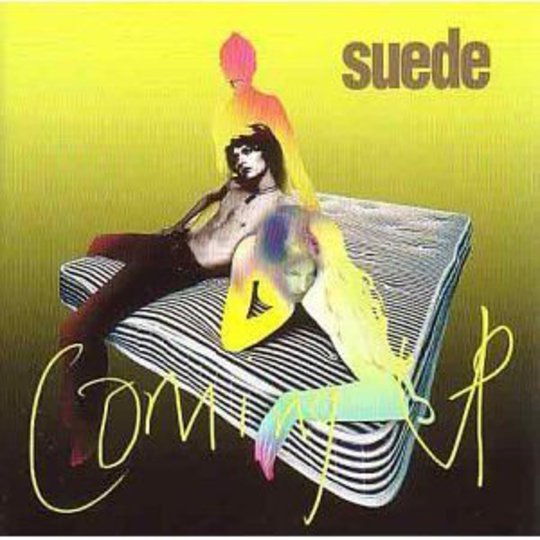Coming Up was the first record I ever bought on CD; I’m pretty sure I purchased Suede’s third album some weeks in advance of actually having anything to play it on, stockpiling it in anticipation of the CD player I knew would be arriving at Christmas. The lurid, absurdly glossy cover art was matched by the equally glossy collection of hit singles contained therein (five of the album’s ten tracks went top ten); it seemed like a very appropriate album with which to make the transition to those shiny disc things.
From a purely solipsistic perspective, then, this lavish reissue feels like a last gasp of the CD for me. As an exhaustive historical document of everything Suede did from the recruitment of Richard Oakes in 1994 to the release of the ‘Fimstar’ single in 1997, it would seem a bit wrong if it were on anything so ephemeral as an MP3. And 27 tracks and a DVD are not something you’re going to cram onto a 12-inch anytime soon.
Anyway, Coming Up is a funny old album. It’s Suede’s biggest seller, home to five of their eight top ten hits, and clearly a record the band are intensely fond of (in the reissue's liner notes Brett Anderson describes ‘Trash’ as having ‘my proudest moment ever as a lyricist’). Yet it’s almost unanimously regarded as the band’s third best record: vastly more enjoyable than Head Music and A New Morning, but lightweight next to the feral sexuality of Suede and druggy grandeur of Dog Man Star. Fifteen years on, it’s hard to see many people changing their mind on that score. But what’s interesting about this reissue is that it goes to show just how deliberate Coming Up’s poppy, trebly, disposable sound was. Of the eight demos included here, none are particularly interesting in and of themselves (bar perhaps ‘Pisspot’, a cute early version of ‘Trash’ with different lyrics). But even without studio tampering, it’s clear Anderson must have had his heart set on the high, cartoonish tones that would characterise the record from the off. It’s also clear from the B-sides that doomy grandeur (‘Europe is Our Playground’), seething violence (‘Together’) and cracked menace (‘WSD’) remained in the band’s repertoire, but had been deliberately excluded from what is by far Suede’s most heavily stylised album.
Loosely speaking, the record can be divided into two halves: the first dominated by fizzy, silly, zinging pop songs like ‘Trash’, ‘Lazy’, ‘Filmstar’ and ‘Starcrazy’, the second by echoey, strung out ballads like ‘Picnic by the Motorway’, ‘The Chemistry Between Us’ and ‘Saturday Night’. In other words, it’s Coming Up then coming down.
On their own terms, the pop songs succeed beyond question: glistening earworms the lot of them, they were written to be chart hits and chart hits they were. But they’re flimsy compared to the band’s earlier music: there’s an intentional vapidity at play that works conceptually, but stands them in poor stead if played next to the more meaning-heavy likes of ‘Animal Nitrate’ et al. Yet if they’re pretty easy to OD on, they’re still immensely fun, far from generic musically (the piledriver groove of ‘Filmstar’ is surely one of the heaviest things to make the top ten), and with an underlying drugginess that often belies Anderson’s innocuous lyrics (see especially ‘Lazy’).
The payoff, though, comes with the slow songs: ‘Saturday Night’ mourned up the chipper Britpop charts and ‘By the Sea’ offers a stately, romantic anchor to the first half’s tomfoolery, but it’s the ruined hysteria of ‘The Chemistry Between Us’ and ‘Picnic by the Motorway’ that give Coming Up its gravitas. Strung out and sad, they’re songs that step blinking into the sunshine and fail to see any joy. ‘The Chemistry Between Us’ sets a grandiose seven minute ballad against Anderson’s creeping fears of emotional fraudulence, while ‘Picnic by the Motorway’ is the terrifying mirror image of Coming Up’s pop songs, a description of a stupid, squalid sally into the outside world despatched with all the élan of a suicide note.
So yeah: Coming Up, coming down – in those terms, it works. The fact it doesn’t add up to a record with the depth of its predecessors is confirmed by Anderson in the liner notes to this reissue, where he suggests a rejigged tracklisting that boots out the melodrama of ‘The Chemistry Between Us’ and adds the more brooding ‘This Time’ and ‘Europe is Our Playground’ instead. But I think the key thing to take away is that Coming Up was very deliberate. Much as the rot really does start to set in on some of the B-sides (‘Duchess’, in particular, is dreadful), and much as the inclusion of the Dog Man Star-era B-sides that Oakes co-wrote feels like a slightly sneaky way of shoring up the quality, then you could easily pull another ten track album of equal strength to Coming Up out of the bonus material here. And while the ultra-trebly mix of Coming Up proper means the remastering job has done little more than slightly declutter ‘By the Sea’ and ‘Saturday Night’, the fact the same courtesy has been extended to the B-sides often means they’re vastly sharper and more vivid than when they appeared on Sci-Fi Lullabies (see: ‘Every Monday Morning Comes’, ‘Have You Ever Been this Low?’, ‘Jumble Sale Mums’).
There’s a DVD included here, which isn’t desperately exciting – it includes an interview that’s essentially Oakes and Neil Codling reminiscing about how they joined the band, some glossy but unexciting promo videos, a faintly pointless Dog Man Star-era concert with Oakes on guitar, and the most worthwhile inclusion, an enjoyably muscular set from the Roundhouse in 1996.
Divorced from 1996 and chart glory, the original, ten track Coming Up makes a little less sense than it did once. But the point of this gratifyingly weighty reissue is that there are 37 songs contained across its two CDs. It shows a Suede who could have made any sort of record they wanted, even without Butler. They chose to make Coming Up: I'm not going to hold it against them.
-
8Andrzej Lukowski's Score






















